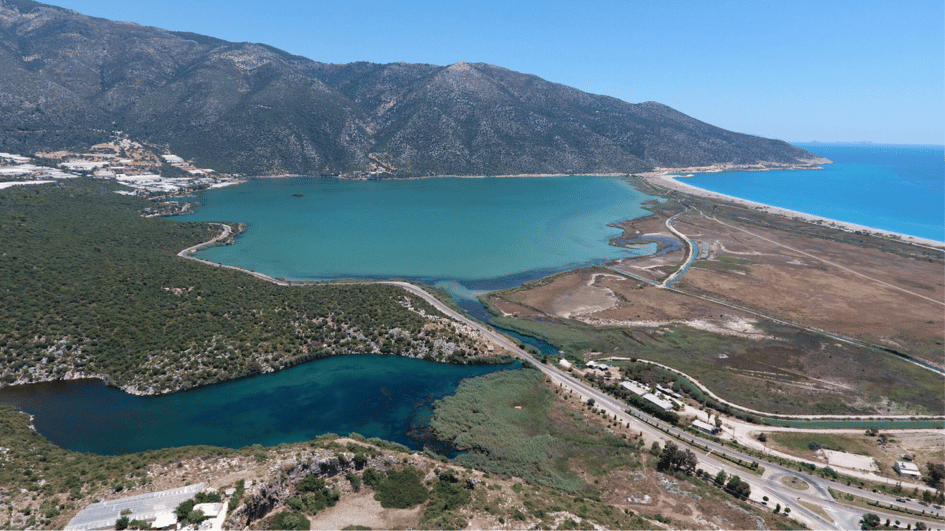Archaeologists oppose highway project in southern Türkiye
ANTALYA

The route of the highway project planned in the western districts of Antalya, Kaş and Demre, have caused controversy. The Environmental Impact Assessment (EIA) report of the highway project, which is to affect historical and natural areas such as Kekova, Myra, and Andriake Kaputaş Canyon rock tombs, states that more than 66,000 trees on the route will be cut down.
The negative effects of the new divided road project, which is set to cost approximately 2.165 billion Turkish Liras, on the natural and cultural heritage in the region is now a matter of debate. It was reported that the highway, which will start in Demre Beymelek, will pass through the ancient cities of Myra, Sura and Hoyran on its route, and will also negatively affect the protected natural areas between Kaş and Kalkan.
The Finike section of the highway, which was opposed by locals because it would divide the agricultural lands, was temporarily excluded from the project, and the section starting from Demre Beymelek to Kaş Kalkan is planned to be 74 kilometers.
The road project includes a total of four lanes, 11 bridges and viaducts, six tunnels and 12 underpasses and overpasses. According to the EIA report, the approximate number of trees to be cut in the forest areas on the route is 66,073. The EIA report will be evaluated by the Environment Ministry’s Board of Inspection Survey on Jan. 4.
The Cultural and Natural Heritage Monitoring Platform’s archaeologist Nezih Başgelen stated that the highway will pass through the central region of Lycia and asked that civil initiatives, especially the ones working for protecting the historical and natural heritage, be given the opportunity to present their opinions for such projects.
“If we cannot develop rational and realistic solutions together, it seems that the unique natural and cultural heritage of Lycia will be irreparably endangered. We will not have the opportunity to regain the cultural landscape of Lycia that we will lose in this process,” he said.
Başgelen noted that the highway project will start from Demre's Beymelek Dalyan, adding, “Covering a total area of 355 hectares, Dalyan is the feeding and growth area of 44 species of fish. Fish species and blue crabs in the sea enter the Beymelek Dalyan between April and August. Young species feed in flocks, especially in the summer season. Forty-four species of fish belonging to 23 families, mainly sea bream, sea bass, magpie and gray mullet, have been identified in Dalyan. Monitoring work on these fish continues within the scope of an EU project.”
Drawing attention to the possible effects of the divided highway that will pass through the central region of Lycia, where many archaeological values are located in Finike, Demre and Kaş districts, Başgelen said, “While the fact that more than 66,000 trees will be cut down for the construction of the new highway creates concern, it is stated that 19,680,825-cubic-meters of excavated material will be released during the works in the region, according to the geotechnical reports. It is stated that 7.2-million-cubic-meters of the excavation material will be used as filling material in the construction of the road, while the remaining material will be transported to regular waste collection centers designated by local municipalities. However, there is no storage area within the borders of both districts where this amount of excavation material can be stored.”
The natural and cultural areas located on the highway route in the project and believed to be damaged due to the project are as follows: Beymelek First Degree Natural Protected Area, Andreake Sura First Degree Natural Protected Area, Kaş-Kekova Special Environmental Protection Area, Kalkan Southern Slopes First Degree Natural Protected Area and Kaputaş Canyon, Sura Archaeological Protected Area.
The places near the route that are expected to be negatively affected by the project are Myra ancient city’s sarcophagus, historical wells, rock cemeteries and historical water cistern.
Local people who oppose the route of the highway in Kekova additionally noted that both residential areas and natural areas will also be damaged.
















